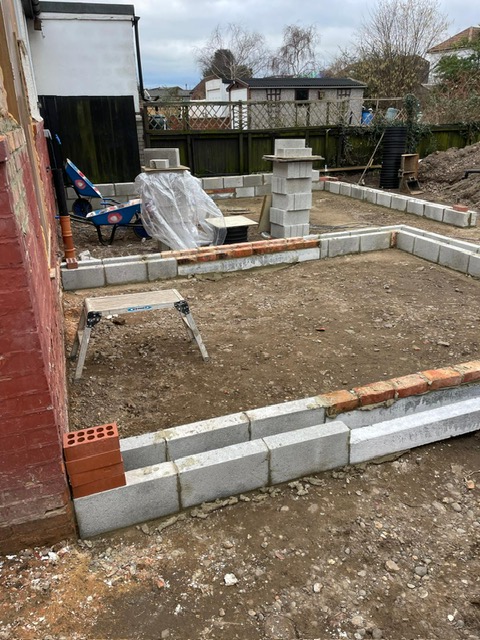If you’re considering extending your home, one of the first questions that probably comes to mind is, “How much do house extensions cost?” Having worked in construction for years, I’ve seen how costs can vary depending on the type of extension, materials used, and where you’re located. I’ll break down the factors that influence the cost of house extensions in the UK and provide insights to help you plan your project effectively.
Why Extend Your Home?
Extensions are a fantastic way to add space and value to your home without the hassle of moving. Whether you’re creating a new bedroom, an open-plan kitchen, or even a home office, the benefits are clear:
- Tailored Space: You can design an area that fits your specific needs.
- Increased Property Value: A well-planned extension can significantly boost the resale value of your property.
- Cost-Effective: Compared to buying a larger house, extending your current property is often more economical.
How Much Do House Extensions Cost in the UK?
The cost of house extensions in the UK depends on several key factors, including size, type, location, and materials. Here’s a breakdown:
1. Size of the Extension
The size of your extension plays a major role in determining the cost. As a rule of thumb, larger extensions cost more due to the increased materials and labour required. On average:
- Small extensions (15-20m²): £20,000–£30,000
- Medium extensions (20-30m²): £30,000–£50,000
- Large extensions (30m² and above): £50,000–£100,000+
2. Type of Extension
Different types of extensions come with different price tags. Here are some typical costs:
- Single-storey extensions: £1,200–£1,800 per m²
- Double-storey extensions: Slightly more cost-effective per m², often between £1,500–£2,500 per m².
- Wraparound extensions: These can cost £50,000 and upwards, depending on complexity.
- Loft extensions: Generally range from £40,000–£70,000.
3. Materials and Finishes
The materials and finishes you choose can significantly impact your budget. For example:
- Brick or blockwork: The most common choice, costing £100–£150 per m² for materials.
- Timber frames: Often cheaper but may require more maintenance over time.
- High-end finishes: Custom kitchens, skylights, or bi-fold doors can add thousands to the overall cost.
4. Location
Where you live also affects costs. Extensions in London and the South East, including Kent, tend to be more expensive due to higher labour and material costs. In these areas, prices can be 10–20% higher than the UK average.
Hidden Costs to Consider
From my experience, clients are sometimes surprised by the hidden costs that can arise during a project. Here are a few to keep in mind:
- Planning Permission and Building Regulations
Not all extensions require planning permission, but if yours does, expect to pay £200–£300 for the application. Building regulations approval typically costs £500–£1,000. - Groundworks
If your extension involves significant groundworks, such as clearing land or laying foundations, this can add £5,000–£10,000 or more. - Utilities and Services
Adding plumbing, heating, or electrics to your extension can cost an additional £2,000–£5,000, depending on complexity. - VAT
Don’t forget that most construction work is subject to 20% VAT, which can significantly increase costs.
How to Plan for Your Extension Budget
Proper planning is key to staying within your budget. Here’s how I recommend approaching it:
- Define Your Needs
Be clear about what you want from your extension. This helps prioritise features and avoid unnecessary expenses. - Set a Realistic Budget
Include a contingency of 10–15% to cover unexpected costs. It’s better to overestimate than fall short. - Get Detailed Quotes
Always request detailed quotes from multiple contractors to compare prices and services. - Plan for the Long Term
While cutting corners might save money now, investing in quality materials and finishes will pay off in durability and resale value.
How I Approach Extensions
When clients ask me about house extensions, I always start by discussing their goals and budget. No two projects are the same, and I believe in tailoring every extension to fit the homeowner’s unique needs. Over the years, I’ve worked on single-storey kitchen extensions, double-storey add-ons, and even more complex designs like wraparounds. By taking the time to plan carefully, I’ve helped clients avoid unnecessary expenses while delivering beautiful, functional spaces.
Sustainability in Extensions
Sustainability is becoming a bigger priority in construction, and extensions are no exception. Here are some ways to make your project greener:
- Energy Efficiency: Invest in high-quality insulation, energy-efficient windows, and solar panels.
- Recycled Materials: Reclaimed bricks, timber, and metal can add character while reducing environmental impact.
- Smart Technology: Consider adding smart heating or lighting systems to reduce long-term energy consumption.
These options not only help the planet but can also save you money in the long run.
Final Thoughts and Next Steps?
Planning a house extension is a big commitment, but with the right knowledge and team, it can be a rewarding investment. If you’re exploring house extensions cost and options, I’d be happy to help. With years of experience in the construction sector, I understand how to balance quality, efficiency, and affordability to deliver exceptional results, every time. Check out some of our work here.
Contact us here to discuss your extension plans. For trusted reviews, visit Google My Business or Trust a Trader to see what our customers have to say.
More Blogs
If you’re planning a home improvement project, you might also find these blogs helpful: Construction Services in Kent and House Conversion Services in Kent

